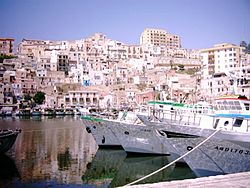Sciacca
| Sciacca | ||
|---|---|---|
| Comune | ||
| Comune di Sciacca | ||

Panorama of Sciacca
|
||
|
||
| Location of Sciacca in Italy | ||
| Coordinates: 37°30′33″N 13°5′20″E / 37.50917°N 13.08889°E | ||
| Country | Italy | |
| Region | Sicily | |
| Province / Metropolitan city | Agrigento (AG) | |
| Frazioni | Lazzarino | |
| Government | ||
| • Mayor | Fabrizio Di Paola | |
| Area | ||
| • Total | 180.98 km2 (69.88 sq mi) | |
| Elevation | 60 m (200 ft) | |
| Population (30 June 2009) | ||
| • Total | 40,894 | |
| • Density | 230/km2 (590/sq mi) | |
| Demonym(s) | Saccensi, Sciacchitani | |
| Time zone | CET (UTC+1) | |
| • Summer (DST) | CEST (UTC+2) | |
| Postal code | 92019 | |
| Dialing code | 0925 | |
| Patron saint | Holy Mary of Soccorso | |
| Saint day | 2 February | |
| Website | Official website | |
Sciacca (Italian: [ˈʃakka]; Greek: Θέρμαι; Latin: Thermae Selinuntinae, Thermae Selinuntiae, Thermae, Aquae Labrodes and Aquae Labodes), also Schiacca, is a town and comune in the province of Agrigento on the southwestern coast of Sicily. It has noteworthy views of the Mediterranean Sea.
Thermae was founded in the 5th century B.C. by the Greeks, as its name imports, as a thermal spa for Selinunte, whose citizens came there to bathe in the sulphurous springs of Mount San Calogero, which rises up behind the town. We have no account of the existence of a town on the site during the period of the independence of Selinunte, though there is little doubt that the thermal waters would always have attracted some population to the spot. Nor even under the Romans did the place attain to anything like the same importance with the northern Thermae; and there is little doubt that Pliny is mistaken in assigning the rank of a colonia to the southern instead of the northern town of the name. Strabo mentions the waters (τὰ ὕδατα τὰ Σελινούντια); and they are again noticed in the Itineraries under the name of Aquae Labodes or Labrodes.
The origins of the town's name have been much debated, with latin "ex acqua",as a reference to the springs of thermal water of the area, or arabic "Syac",meaning bath, and al Saqquah, dating back to the cult of the Syrian god "Shai al Quaaum", as possibilities.
...
Wikipedia


